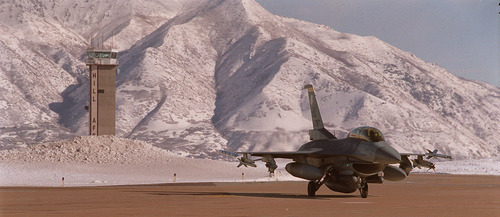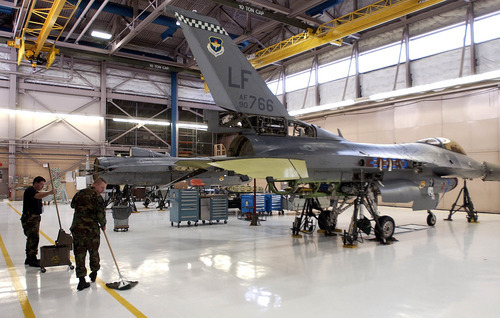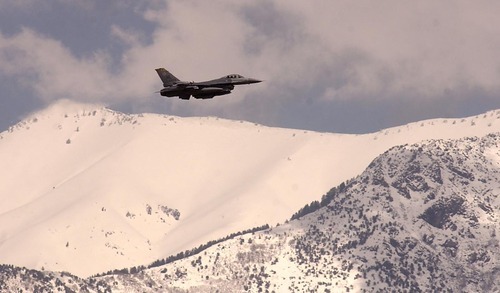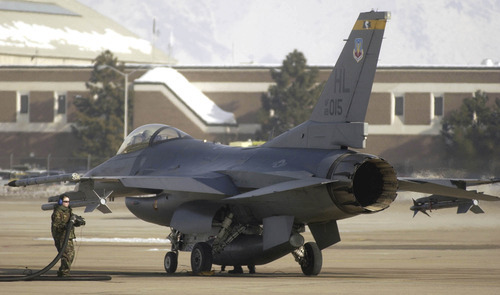This is an archived article that was published on sltrib.com in 2012, and information in the article may be outdated. It is provided only for personal research purposes and may not be reprinted.
Washington • President Barack Obama wants to shutter some military bases to help lower the nation's massive debt, a proposal that has Utah officials concerned about the survival of Hill Air Force Base, one of the state's largest employers.
Defense Secretary Leon Panetta announced Thursday that the president plans to call on Congress to create a new Base Closure and Realignment Commission, or BRAC, as part of his proposal to reduce military spending by $487 billion in the next decade, as Congress has mandated.
The primary way the Defense Department plans to save that money after a decade of war is by reducing the size of the force and eliminating some weapons programs, cuts that Panetta said would impact every state.
"This will be a test, a test on whether reducing the deficit is about talk or about action," said Panetta, expecting members of Congress to fight his recommendations.
He said with a smaller military it only makes sense to also reduce the number of bases.
But Rep. Rob Bishop, R-Utah, believes the military should examine the impact of the proposed cuts before moving forward with a new round of BRAC hearings. Bishop also criticized Obama for military cuts that he feels are too deep.
"I am concerned about the impact BRAC could have on jobs in Utah and across the country, especially as we work to bring stability and greater certainty to our waning economy," Bishop said. "This past year this administration reinforced the fact that they do not appear to recognize the significance of what is done at places like Hill."
Sen. Orrin Hatch, R-Utah, said he is "upset" about the call to close bases and promised to work with Utah political and business leaders to "lay out why Hill Air Force Base is second to none and must remain a central figure in keeping America safe."
The government has used the BRAC process repeatedly over the years to make the politically difficult choice of which bases to close or shrink, decisions that have obvious economic impact for the communities surrounding such facilities.
To launch a new round, Congress must pass a law creating a commission, setting its deadlines and the qualifications of its members. Once created, the Pentagon then hands over its list of recommended realignments and closures. The BRAC commission conducts its own review, makes changes and forwards its work to the Oval Office. If the president signs off, Congress has 45 days to reject the proposal or the cuts go into effect.
Former Utah Congressman Jim Hansen sought to protect Hill as a member of the House Armed Services Committee and actually served as one of the nine BRAC commissioners when the last round of closures took place in 2005.
The Farmington resident said he "totally agrees" that it's time to close some bases, and he has some advice on the best way to proceed.
Hansen thinks Congress should reduce the number of generals and add some business people to the commission because he said military leaders "tend to take care of their buddies."
He also thinks most of the cuts should hit installations overseas.
"People don't realize we have military in probably 50 different countries and some of them are there for no other reason than to bolster the economy of a little country," he said.
Sen. Carl Levin, D-Mich., who leads the Senate Armed Services Committee, is of a similar mind, telling reporters on Thursday that he could not support closing bases in the United States until the military shuttered some in other lands.
Hansen also had a word of warning for Hill Air Force Base and its supporters. He said the recent economic investment in the Falcon Hill business park near the base or the addition of a new squadron of F-35s won't necessarily save the base.
"It doesn't mean squat," he said. "When you start looking at the eight criteria, the first one is the needs of the military. The economy of the area is a consideration, but it is way down the list."
Hill has faced the ax before.
In 1995, to the dismay of city residents and military staff, Hill's Ogden Air Logistics Center was added to the closure list. But BRAC commissioners ultimately removed it, instead closing California's McClellan Air Force Base following intense behind-the-scenes politicking that went all they way up to the president.
In 2005, BRAC commissioners also knocked on Hill's door to tour its facilities, sparking the state Legislature to pump millions of dollars into the Utah Defense Alliance, an outside group that lobbied for Hill's survival. In that round, Hill received six more F-16 fighters when the commission decided to shutter a New Mexico base.
While skeptical of the impact of such lobbying efforts, Hansen said he is not too worried about Hill's immediate future. It is one of three remaining air logistics centers, and its biggest asset is that it hosts a massive test and training range used by pilots throughout the nation, and it services and repairs the Minuteman III, the nation's nuclear missile.
Twitter: @mattcanham
Laura Schmitz contributed to this report.









